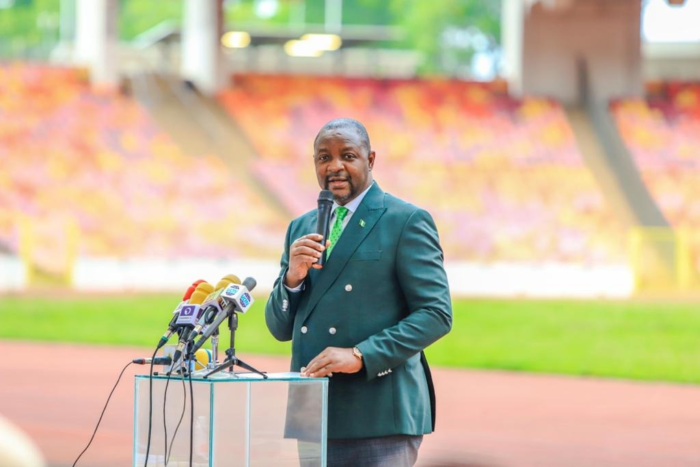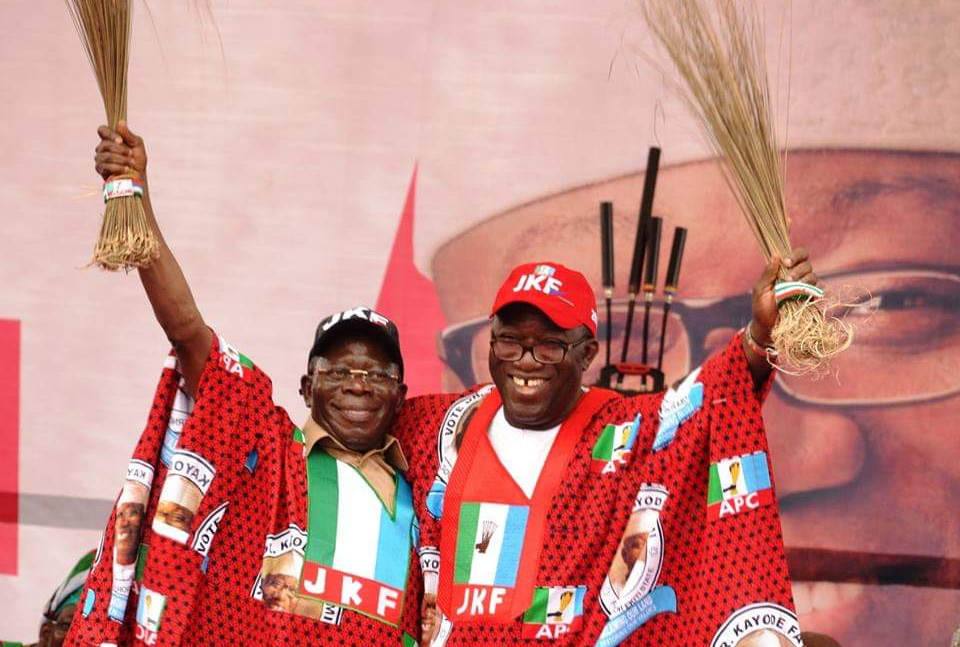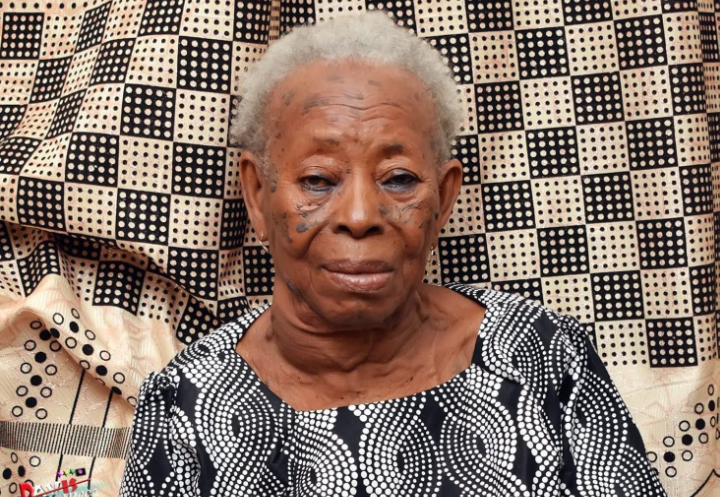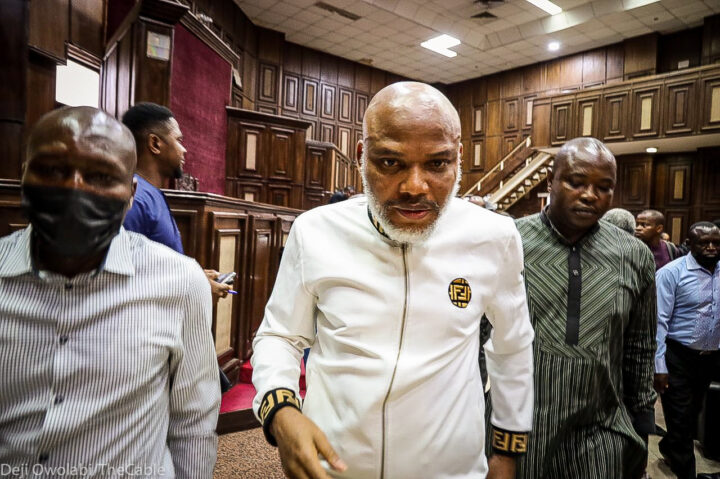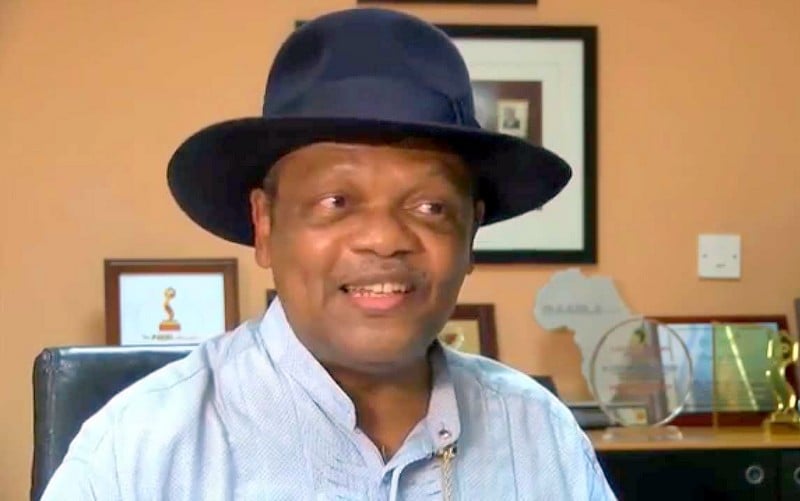Students protesting with placards on the use of Hijab. Photo credit: Muslim news.
BY ABDULGANIYU ABDULRAHMAN AKANBI
What appeared to have started like an uneventful morning in Ijagbo area of Oyun LGA, Kwara state, on February 3, 2022, later degenerated into chaos as violence broke out during a peaceful protest led by Muslims over a move by the Oyun Baptist High School (OBHS) administration to ban students from wearing hijab.
The resulting melee, which witnesses said was characterised by gunshots, led to the death of a resident identified as Habeeb Idris, while 11 other demonstrators sustained injuries.
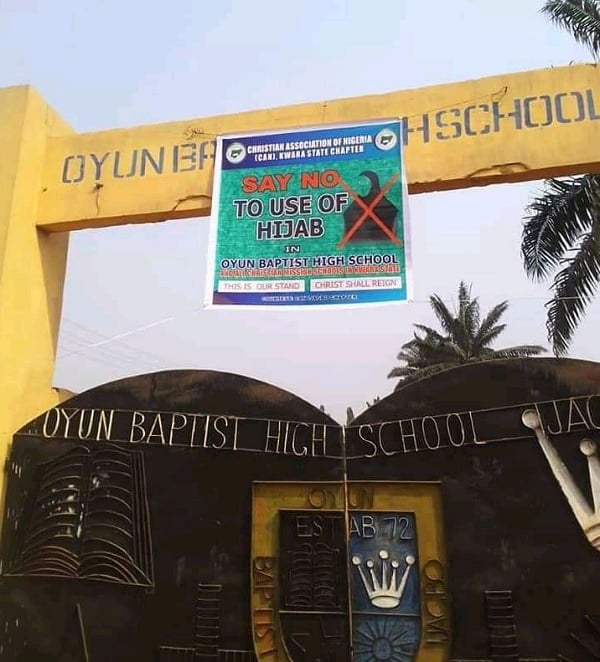
The protesters, which included parents and students, displayed cardboards inscribed with phrases like ‘OBHS Ijagbo, No Hijab No School’, ‘Islam is Religion of Peace not Violence’, ‘Hijab is our Constitutional Right, No Compromise’, among others.
Advertisement
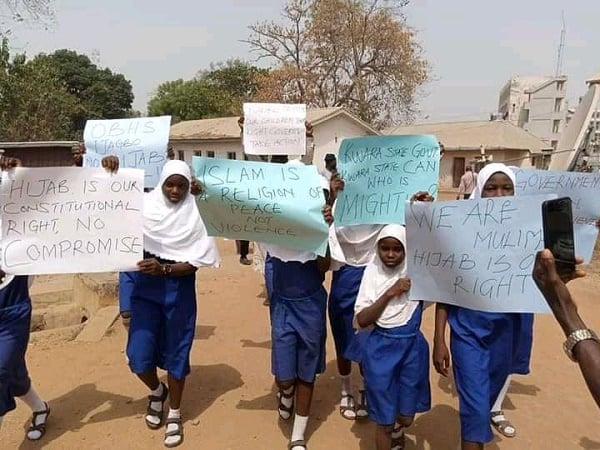
Speaking on the violence recorded during the demonstration, a Muslim protester insisted that the plan was for a peaceful protest.
“How can we kill ourselves? How can we be so daft to stage a protest and harm ourselves? We didn’t carry arms and that was even the reason why we were unable to defend ourselves when we were attacked,” the protester, who sought anonymity, said while recounting the incident.
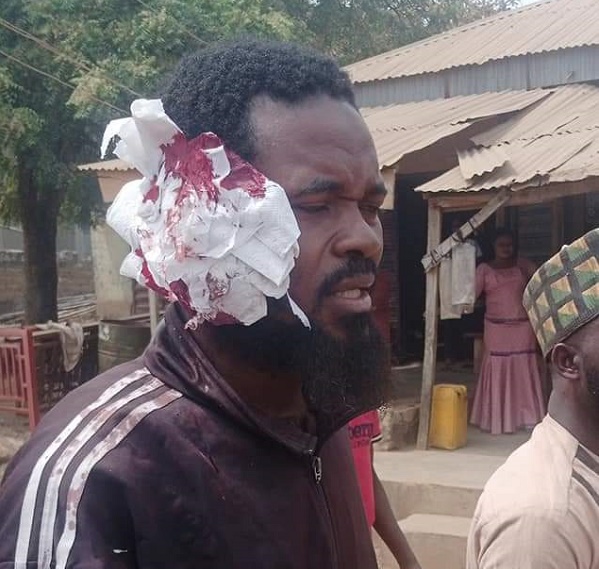
The state government later shut down the school. However, the monetary compensation offered by the government was rejected, with the Muslim community insisting that all those affected by the violence be properly compensated.
Advertisement
BACKGROUND
The hijab crisis is not peculiar to OBHS. The genesis of the conflict dates back to 2012 when Christian groups demanded the return of mission schools taken over by the government in the 1970s during the military regime of Yakubu Gowon — under the plan by the government to provide “grants-in-aid”. The Kwara government, however, refused to grant the request, citing constraints over the Education Law of 2006. The law was later repealed.
Following the non-assent of the government to their demand, the groups — which included the Christian Association of Nigeria (CAN), Cherubim and Seraphim Movement Church, Nigerian Baptist Convention, and Evangelical Church Winning All (ECWA) — filed a suit against the government. Later, some Muslim groups joined the case as co-respondents, highlighting the consequences of returning to schools to their original status.
In 2016, the state high court ruled in favour of the government, after which the Christian groups appealed the judgment. In September 2019, the appeal court sitting in Ilorin affirmed the judgment of the state high court.
Advertisement
The court held that the state government remains the owner of schools and the refusal of the schools to allow the use of hijab is discriminatory and not in line with the provisions of the constitution.
CONFLICT DESPITE COURT RULING
Following the court of appeal ruling, Muslim groups asked the government to compel the Christian mission schools to allow their wards wear hijab. However, some of the schools insisted on the ban.
In February 2021, the Kwara government ordered the closure of 10 schools over the controversy. The affected schools were C&S College, Sabo-Oke; St. Anthony’s Secondary School, Offa road; ECWA School, Oja Iya; Surulere Baptist Secondary School; and Bishop Smith Secondary School, Agba Dam.
Advertisement
Others were CAC Secondary School, Asa Dam road; St. Barnabas Secondary School, Sabo-Oke; St. John School, Maraba; St. Williams Secondary School, Taiwo Isale; and St. James Secondary School, Maraba.
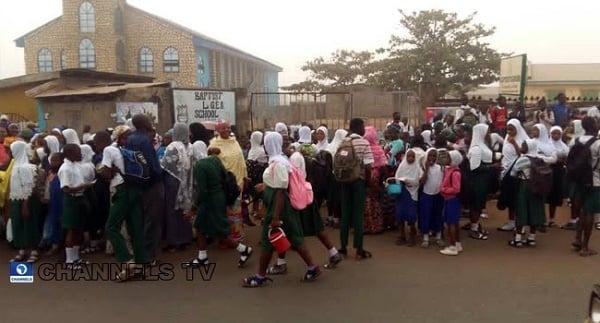
After the government’s directive for the schools to be reopened in March 2021, the protests continued and the development resulted in another directive by the state for the schools to remain shut. The order was, however, reversed in April 2021.
Advertisement
ONE YEAR LATER, CRISIS LINGERS
On February 28, 2022, this reporter (posing as a student researcher) visited some of the affected schools in Ilorin and Oyun to ascertain the extent of the hijab crisis.
Advertisement
During an interview, one of the principals, who didn’t want to be named, lamented the violence that rocked the protests, adding that wearing of hijab has no connection with students’ education and morality.
“See the trauma they caused for us — the principals, students, missionary board and the government. Can we ever forget it? I can’t forget the day God saved me from the pebbles and attacks,” the principal said.
Advertisement
“Government said the Muslims should use moderate hijab while the Christians will continue using berets. Since then, we have complied with the directive of the government as to the sample given to us.”
The principal maintained that regardless of the hijab controversy, the institution remains a mission school, and also declined to respond to questions about the court rulings.
Also speaking on the development, another teacher (a Muslim) said both parties were trying to protect their beliefs, irrespective of the legal consequences of their actions.
“The truth of the matter is that both Muslims and Christians are trying to protect their religion and integrity. In the olden days, the school was a missionary school. Later, it was acquired, monitored, sponsored and equipped by the government but the name remains as it was then. The government honoured the missionaries that pioneered the school, that’s why the names were not changed,” he said.
“When the matter got to the court, we realised that the government had been in control. They have been rehabilitating, refurbishing and building the schools. The Christians claim that they are the owners, but according to the evidence presented, the land was not sold to them.”
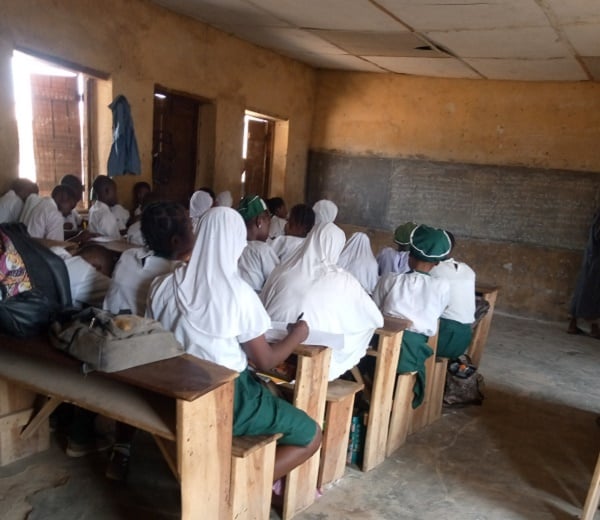
‘TEACHERS, STUDENTS ARE MAIN LOSERS’
Mrs. Adeyemi N.B., a teacher at the Baptist High School in Surulere, Ilorin, said teachers and students are the main losers in the hijab crisis, adding that the peaceful co-existence in the schools has been affected.
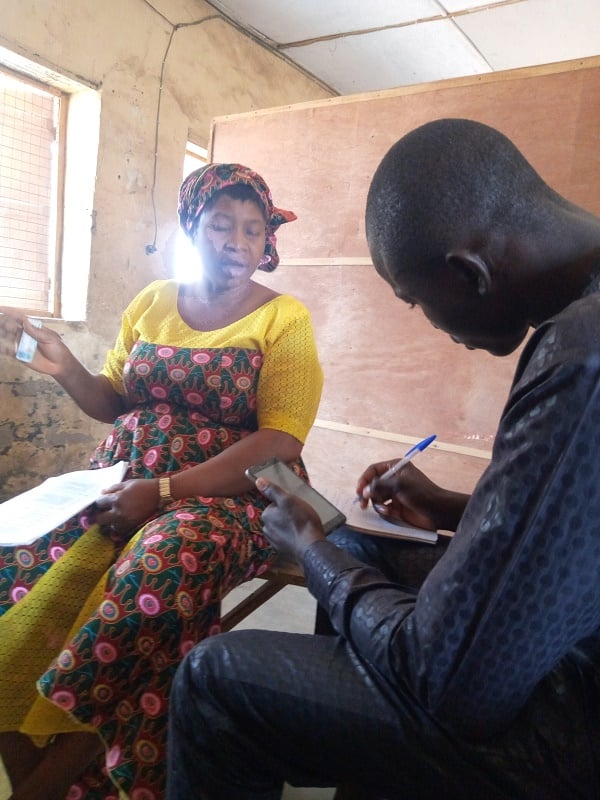
“Before the crisis, our students were doing well. But when the crisis started, we noted that some of our students left the school. After resumption, whenever we issued assignments, they wouldn’t pay much attention to it. The crisis has brought laziness and lack of seriousness. They scored low grades in the assessments we gave them. Overall, morals have declined,” she said.
“I had a good relationship with Muslim teachers, but when the crisis started, the relationship declined,” she said, but added that officials of the school had reconciled both parties.
While recounting their experiences, students said the crisis affected their progress in school and also caused them to lose friendships, as many students joined other institutions.
OBHS REMAINS SHUT — AFTER OVER TWO MONTHS
The OBHS, shut in February 2022 after the fresh protests over the use of hijab turned violent, is still under lock and key.
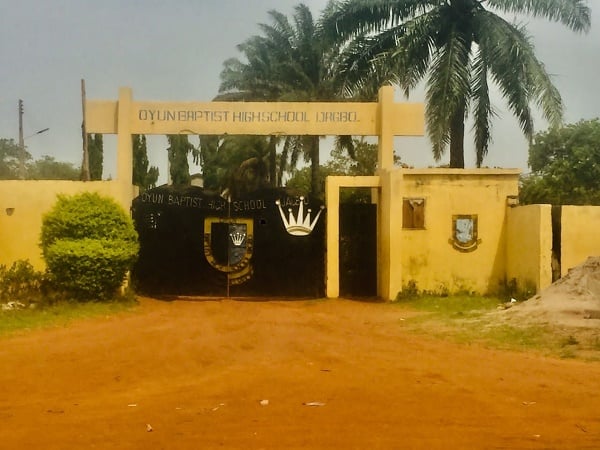
During a visit to the school — which is under the watch of security operatives — this reporter was summoned to a police station where the divisional police officer (DPO) directed him to the ministry of education on matters to do with the school reopening.
However, for residents of the area, they want justice to prevail in order to prevent future occurrence. The survivors of the attack are also calling for the prosecution of perpetrators, and fair implementation of government policies.
“We are pleading with the government to do the needful and if that is not done, it means we are not important and they don’t care for us. If justice does not prevail, the government will be seen to promote religious bias,” Adeshina Mashood, a parent, said.
‘NO HIJAB IN CHRISTIAN MISSION SCHOOLS’
Olawuyi James, a senior pastor of Emmanuel Baptist Church, Ilorin, and a member of the Kwara chapter of CAN, in a telephone conversation, said the case is currently before the supreme court, insisting that hijab would not be allowed in mission schools.
“We are not objecting to Muslims using their hijab in full government schools, but not in Christian schools. There would continue to be resistance and civil disobedience by the Christians because we also have our fundamental rights and faith that we will not compromise,” he said.
“This is not just about fundamental rights of women. You can’t talk about fundamental rights of a Muslim in a Christian school but you’re not considering that same thing as fundamental rights for a Christian in a Muslim school.
“They (the government) are only talking about hijab and Muslim practice in Christian schools; they are not talking about Christian practices in Muslim schools.
“What took us to court has nothing to do with hijab. It was only one of the presiding judges that mentioned the issue of hijab as a fundamental right.”
However, Abubakar Aliagan, a professor of Islamic studies, said Muslims want peace to reign without deprivation of religious rights and practices.
“I see no quarrel in this issue if not that some overzealous religious bigots are overblowing the issue. We don’t need the approval of a Christian before we practise our religion the way Almighty Allah has ordained in the Qur’an, neither do the Christians need the approval of the Muslims for them to practise their religion the way it should be practised. The umpire that we have is the constitution and what Muslims are demanding is very simple,” he said.
“They can bring the documents signed by our forebears — the Balogun’s, the Alanguas. That is the one that they can tender as evidence. They need to be informed that when our parents donated the land to the Christian leaders free of charge, they donated those lands to them because it would be used in public interest — that Muslim children will also benefit from the activities of the school.”
Speaking on the violence that erupted in Ijagbo, Aliagan said the Muslim groups are ready to comply with the government’s request, and commended the efforts of the state government in ensuring peace and harmony in the state.
‘151 STUDENTS MAY MISS WASSCE’
In March 2022, at the inaugural sitting of the seven-member committee established by the state to investigate the crisis at OBHS, Francis Lambe, the school principal, expressed worry over the fate of 151 students expected to participate in the West African Senior School Certificate Examination (WASSCE), which began on May 16.
Lambe urged the state government to fast-track the reopening of the school to prepare senior students for the examinations.
On his part, Shehu Omoniyi, chairman of the panel, called for peaceful co-existence in the state, and appealed to both parties and relevant stakeholders to cooperate.
Meanwhile, the committee submitted its report to Abdulrahman Abdulrazaq, governor of Kwara, on April 29, while on May 14, the state appointed a six-member white paper committee examine the report and make recommendations to the government on the crisis.
Efforts to get further reactions from the government on other efforts to ensure lasting solutions to the crisis proved futile as Rafiu Ajakaye, chief press secretary to the governor, directed the reporter to speak with the state education ministry.
However, Sa’adatu Kawu, commissioner for education, declined to speak on the crisis.
At the moment, the injuries are healing, but it remains to be seen if the issues brought to the fore by the crisis will be addressed soon in order to avoid disrupting the smooth running of the education sector. Meanwhile, an uneasy calm pervades schools in Kwara.
This story was produced with the support of the International Center for Journalists (ICFJ), in partnership with Code for Africa and Ayin Network.
Add a comment
